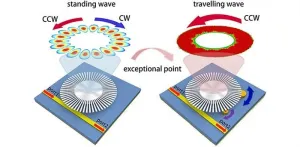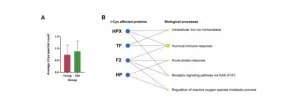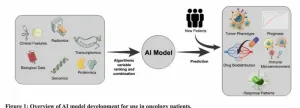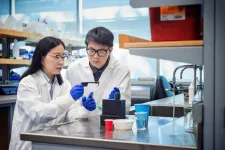Dumas receives funding for study of how distinct NMDA receptor signaling domains regulate hippocampal network dynamics
2024-08-27
(Press-News.org)
Dumas Receives Funding For Study Of How Distinct NMDA Receptor Signaling Domains Regulate Hippocampal Network Dynamics
Theodore Dumas, Associate Professor, Psychology, College of Humanities and Social Sciences (CHSS), received funding for the project: “Distinct NMDA receptor signaling domains regulate hippocampal network dynamics.
Dumas and his collaborators hypothesize that in wildtype mice, NMDA receptors regulate hippocampal network oscillatory activity (slow gamma frequency) in the absence of ion conductance (nonionotropic) and that enhancing GluN2B subunit-type nonionotropic signaling will increase slow gamma power and enhance spatial memory retrieval.
The researchers will test these hypotheses by assessing slow gamma oscillations (and coupling with other pertinent oscillatory bands), particularly during immobility prior to movement to a known goal location, and spatial memory accuracy in mice expressing chimeric GluN2 subunits in: 1) forebrain principal cells, 2) hippocampal principal cells, or 3) hippocampal parvalbumin-positive (PV+) interneurons.
This study is the first of its kind to differentiate the roles of two separate NMDA receptor signaling streams in the regulation of hippocampal network activity and spatial memory retrieval. Outcomes from this study will explain why treatments for schizophrenia directed at NMDA receptors in general are only moderately effective and will identify more specific therapeutics targets.
Dumas received $231,547 from the National Institutes of Health for this project. Funding began in Aug. 2024 and will end in late July 2026.
###
ABOUT GEORGE MASON UNIVERSITY
George Mason University is Virginia’s largest public research university. Located near Washington, D.C., Mason enrolls more than 40,000 students from 130 countries and all 50 states. Mason has grown rapidly over the past half-century and is recognized for its innovation and entrepreneurship, remarkable diversity, and commitment to accessibility. In 2023, the university launched Mason Now: Power the Possible, a one-billion-dollar comprehensive campaign to support student success, research, innovation, community, and stewardship. Learn more at gmu.edu.
END
ELSE PRESS RELEASES FROM THIS DATE:
2024-08-27
DNA methylation is a process in which a methyl group is attached to the cytosine base of the DNA molecule, and a major way that DNA is epigenetically marked. Epigenetic modifications can act as on-off switches to regulate gene expression and help generate diverse cell types without changing the underlying DNA sequence. It is how the body ensures that brain-related genes don’t get turned on in heart cells, for example.
For this reason, maintenance of the DNA methylation pattern is important to ensure the correct and consistent function of each cell type. But this is no easy feat: the DNA methylation pattern can change over time, and this is linked to a variety of diseases. One ...
2024-08-27
In recent years, advances in photonics and materials science have led to remarkable developments in sensor technology, pushing the boundaries of what can be detected and measured. Among these innovations, non-Hermitian physics has emerged as a crucial area of research, offering new ways to manipulate light and enhance sensor sensitivity. A recent study published in Advanced Photonics Nexus reports a breakthrough in this field, presenting a new type of sensor that leverages exceptional points (EPs) to achieve unprecedented levels of sensitivity.
This study introduces a highly sensitive and reconfigurable sensor based on a single ...
2024-08-27
LOS ANGELES — Over 6.5 million Americans experience chronic wounds — wounds that do not heal after a few months. Almost all such wounds contain bacteria, which, if not detected and removed, can lead to severe infection and resulting complications, including amputation if a limb is involved.
This is especially true for patients with diabetic foot ulcers (open sores), which affects one-third of people with diabetes. Approximately 20% of those who develop a diabetic foot ulcer will require a lower-extremity amputation, according ...
2024-08-27
UCLA has received a $120 million commitment from surgeon, inventor and philanthropist Dr. Gary Michelson and his wife, Alya, to kick-start the California Institute for Immunology and Immunotherapy, an innovative public-private partnership aimed at spurring breakthrough discoveries that prevent and cure diseases and catalyze economic growth and innovation in Los Angeles.
Michelson, a spine surgeon and prolific inventor who holds nearly 1,000 individual patents, is co-founder and chair of the board of the institute, which will be housed at UCLA’s state-of-the-art research park.
The gift, distributed via ...
2024-08-27
Dunick Receives Funding For Center For Economic Education
Jason Dunick, Associate Chair and Term Associate Professor, Economics, College of Humanities and Social Sciences (CHSS), received $108,692 from Virginia Council on Economic Education for: “Center for Economic Education.”
Dunick will use this funding to support the continuation of the services of the Center for Economic Education. The Center supports K-12 teachers who are teaching economics and personal finance in Virginia.
This grant represents the renewal of a long-standing relationship with the ...
2024-08-27
FOR IMMEDIATE RELEASE
Media Contacts:
Colleen McDonald
Sr. Consultant, Earned Media
Kara Reed
Director of Development
Lisa Babin
Executive Director of Communications
Medical College of Wisconsin
University of California San Diego
LSU Health Shreveport
414.801.3146 | cmcdonald@mcw.edu
217.390.6629 | k3hendrickson@ucsd.edu
318.675.8769 | lisa.babin@lsuhs.edu
Milwaukee, Wis., August 27, 2024 – John McCorvy, PhD, Assistant Professor in the Department ...
2024-08-27
“The results indicated a significant increase in cumulative t-Cys levels and the total number of t-Cys residues in aging and aged mice proteomes compared to young groups.”
BUFFALO, NY- August 27, 2024 – A new research perspective was published in Aging (listed by MEDLINE/PubMed as "Aging (Albany NY)" and "Aging-US" by Web of Science), Volume 16, Issue 15 on July 25, 2024, entitled, “Trioxidized cysteine and aging: a molecular binomial that extends far beyond classical proteinopathic paradigms.”
Oxidative stress (OS) - characterized by an imbalance between oxidants and antioxidants - leads to the formation ...
2024-08-27
“Properly leveraged AI-based techniques could herald a new era of precision medicine guided by non-invasive, imaging-based disease evaluation."
BUFFALO, NY- August 27, 2024 – A new editorial was published in Oncotarget's Volume 15 on August 26, 2024, entitled, “Artificial intelligence: A transformative tool in precision oncology.”
Artificial intelligence (AI) is revolutionizing society and healthcare, opening new possibilities for precision medicine. In oncology, immunotherapy (IO) has similarly transformed cancer treatment with novel ...
2024-08-27
Micro- and nanoplastics are in our food, water and the air we breathe. They are showing up in our bodies, from testicles to brain matter.
Now, University of British Columbia researchers have developed a low-cost, portable tool to accurately measure plastic released from everyday sources like disposable cups and water bottles.
The device, paired with an app, uses fluorescent labeling to detect plastic particles ranging from 50 nanometres to 10 microns in size – too small to be detected by the naked eye – and delivers results in minutes.
The method and findings are detailed in ACS Sensors.
“The breakdown of larger plastic pieces into microplastics ...
2024-08-27
About The Study: White patients discharged from the emergency department with a nonspecific diagnosis of interest were significantly more likely than Black patients to receive related diagnostic testing in this study. The extent to which this represents diagnostic test overuse in white patients vs undertesting and missed diagnoses in Black patients deserves further study.
Corresponding Author: To contact the corresponding author, Michael I. Ellenbogen, M.D., email mellenb6@jhmi.edu.
To access the embargoed study: Visit our For The Media website at this link https://media.jamanetwork.com/
(doi:10.1001/jamanetworkopen.2024.30306)
Editor’s ...
LAST 30 PRESS RELEASES:
[Press-News.org] Dumas receives funding for study of how distinct NMDA receptor signaling domains regulate hippocampal network dynamics





